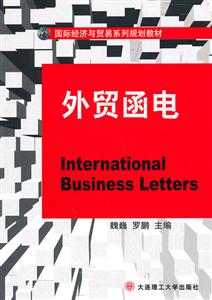-
>
以利為利:財政關(guān)系與地方政府行為
-
>
立足飯碗 藏糧于地——基于中國人均耕地警戒值的耕地保護視角
-
>
營銷管理
-
>
茶葉里的全球貿(mào)易史(精裝)
-
>
近代華商股票市場制度與實踐(1872—1937)
-
>
麥肯錫圖表工作法
-
>
海龜交易法則
外貿(mào)函電 版權(quán)信息
- ISBN:9787561155295
- 條形碼:9787561155295 ; 978-7-5611-5529-5
- 裝幀:一般膠版紙
- 冊數(shù):暫無
- 重量:暫無
- 所屬分類:>>
外貿(mào)函電 本書特色
《外貿(mào)函電》主要介紹了與國際貿(mào)易進出口各個環(huán)節(jié)相關(guān)的英文信函的寫作,是一門應用性和實踐性很強的綜合專業(yè)課程。其任務是培養(yǎng)學生掌握外貿(mào)商務活動過程中書信寫作的基本技能,并能在實際業(yè)務中熟練地加以運用。 本書介紹了外貿(mào)商務活動各個環(huán)節(jié)函電往來的書寫,包括:建立貿(mào)易關(guān)系、詢盤、報盤、還盤、訂貨、支付、結(jié)算、包裝、運輸、保險、索賠和理賠、代理等,涉及到進出口過程中的多種情況和不同問題的處理。每個單元包含實務介紹和寫作技巧,以及大量的句型、替換練習和范文。
外貿(mào)函電 內(nèi)容簡介
本書介紹了外貿(mào)商務活動各個環(huán)節(jié)函電往來的書寫,包括:建立貿(mào)易關(guān)系、詢盤、報盤、還盤、訂貨、支付、結(jié)算、包裝、運輸、保險、索賠和理賠、代理等,涉及到進出口過程中的多種情況和不同問題的處理。每個單元包含實務介紹和寫作技巧,以及大量的句型、替換練習和范文。
外貿(mào)函電 目錄
objectives
1. 1 writing principles
1. 2 rules of good writing
1. 3 writing procedures
1. 4 exercises
chapter 2 the form of a business letter
objectives
2.1 the layout of a business letter
2.2 the structure of a business letter
2.3 exercises
chapter 3 establishing business relations
objectives
3.1 general introduction
3.2 sample letters
3.3 extension
3.4 exercises
chapter 4 enquiries and quotations
objectives
4.1 general introduction
4.2 sample letters
4.3 extension
4.4 exercises
chapter 5 offers and counter-offers
objectives
5.1 general introduction
5.2 writing contents of an offer
5.3 sample letters
5.4 extension
5.5 exercises
chapter 6 conclusion of business
objectives
6.1 general introduction
6.2 sample letters
6.3 extension
6.4 exercises
chapter 7 payment matters
objectives
7.1 greneral introduction
7.2 sample letters
7.3 extension
7.4 exercises
chapter 8 packing and shipping
objectives
8.1 general introduction
8.2 sample letters
8.3 extension
8.4 exercises
chapter 9 insurance
objectives
9.1 general introduction
9.2 sample letters
……
外貿(mào)函電 節(jié)選
《外貿(mào)函電》介紹了外貿(mào)商務活動各個環(huán)節(jié)函電往來的書寫,包括:建立貿(mào)易關(guān)系、詢盤、報盤、還盤、訂貨、支付、結(jié)算、包裝、運輸、保險、索賠和理賠、代理等,涉及到進出口過程中的多種情況和不同問題的處理。每個單元包含實務介紹和寫作技巧,以及大量的句型、替換練習和范文。
外貿(mào)函電 相關(guān)資料
插圖:The letters you send you must create a good first impression. To achievethis, "put yourself in the reader's site" and try to imagine how he will feel aboutwhat you write. Ask yourself constantly, "What are his needs, his wishes, hisinterests, his problems, and how can I meet them?" "What would be my ownfeelings, if I were to receive a letter of the kind I propose to write?" Try toimagine that you are receiving rather than sending the letter and emphasize the"You" attitude rather than me or us.When you write or dictate a business letter, try to feel a genuine interest inperson you are writing to and in his problems. Say what you have to say withsincerity and make sure that it sounds sincere. Express your thoughts in yourown words and in your own way. Be yourself. Write so that what you say wouldsound natural if reading over the telephone.If a letter is to achieve its purpose, its tone must be right. Before beginningto write think carefully about the way in which you want to influence yourreader. Ask yourself, "What do I want this letter to do?" and then expressyourself accordingly, being persuasive apologetic, obliging, firm and so on,depending on the effect you want to produce.
- >
山海經(jīng)
- >
小考拉的故事-套裝共3冊
- >
中國歷史的瞬間
- >
經(jīng)典常談
- >
推拿
- >
上帝之肋:男人的真實旅程
- >
二體千字文
- >
月亮虎















